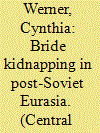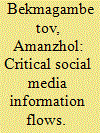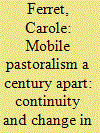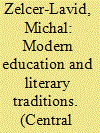| Srl | Item |
| 1 |
ID:
161356


|
|
|
|
|
| Summary/Abstract |
Throughout Eurasia, bride kidnapping continues to be a fairly common way to get married. The practice is becoming increasingly controversial. Some local actors argue the practice is a cultural tradition, while others question its acceptability, particularly when a woman is forced to marry against her will. Many scholars, journalists and non-governmental organization workers view non-consensual variations of bride kidnapping as a form of gender-based violence. In October 2016, an interdisciplinary group of scholars gathered at the annual Central Eurasia Studies Society conference to assess existing scholarship on bride kidnapping in post-Soviet Eurasia. Using an innovative format, this paper offers an edited transcript of that roundtable discussion. The roundtable format provides readers an opportunity to see a diverse range of perspectives and opinions in response to several questions about bride kidnapping. This paper provides a thorough introduction to key issues surrounding bride kidnapping and offers suggestions for areas that need further exploration.
|
|
|
|
|
|
|
|
|
|
|
|
|
|
|
|
| 2 |
ID:
161353


|
|
|
|
|
| Summary/Abstract |
In political regimes where traditional mass media are under state control, social networking sites may be the only place where citizens are exposed to and exchange dissident information. Despite all the attempts, complete control of social media seems to be implausible. We argue that the critical information that people see, read and share online undermines their trust in political institutions. This diminishing trust may threaten the legitimacy of the ruling regime and stimulate protest behaviour. We rely on original survey data of Kazakhstani college students to confirm these expectations. The data are unique in that they directly measure exposure to critical/dissident information, as opposed to simply assuming it. The analysis leverages Coarsened Exact Matching to simulate experimental conditions. This allows us to better identify the consequential mechanism and the attitudinal precursor by which social media influence protest in an authoritarian context.
|
|
|
|
|
|
|
|
|
|
|
|
|
|
|
|
| 3 |
ID:
161352


|
|
|
|
|
| Summary/Abstract |
This article challenges the ahistorical figure of the ‘steppe nomad’ by presenting some of the main characteristics of Kazakh nomadic pastoralism, which vary widely in time and space. It compares two ethnographic studies conducted a century apart in the same place in south-eastern Kazakhstan: a statistical survey from 1910 and an account of a transhumance in which the author took part in June 2012. Sedentary pastoralism now prevails in Kazakhstan, but a system of seasonal pastures endures in some areas. In Raĭymbek District (Almaty Province), vertical nomadism takes advantage of the altitudinal variations of vegetation and climate. This article demonstrates both the continuity of nomadic routes despite successive crises during the twentieth century, and considers the overall change from quasi-nomadism to quasi-sedentarism. This comparison a century apart also fosters dialogue between history and social anthropology through a dual synchronic approach, seeking to restore historicity to our understanding of pastoral nomadism.
|
|
|
|
|
|
|
|
|
|
|
|
|
|
|
|
| 4 |
ID:
161355


|
|
|
|
|
| Summary/Abstract |
In 1949, illiteracy among both Uyghurs and Tibetans was similar to that throughout China and estimated as higher than 90%. Since then, the rate of illiteracy in Xinjiang has shrunk considerably, while in Tibet it has remained the highest in China. This gap can explain the difference between the small volume of literature published annually in Tibet and the extensive literature that appears yearly in Xinjiang. A major reason for the high literacy rate and the emergence of a thriving modern literature in Xinjiang is the system of modern education that developed in the region at the start of the twentieth century. In contrast, in Tibet, the religious conservatism of the Buddhist elite prevented the introduction of modern education in order to retain local cultures. The comparison of the influences of modern education on the creation of literary traditions allows us to examine the continuity of Uyghur and Tibetan cultures in the context of contemporary China.
|
|
|
|
|
|
|
|
|
|
|
|
|
|
|
|
| 5 |
ID:
161354


|
|
|
|
|
| Summary/Abstract |
This article studies the masculinities of Russian-speaking miners in Kazakhstan through an ethnographic study conducted in a miners’ sanatorium, a place of heightened sociality. Studies of gender in Central Asia have mostly focussed on women, and both masculinity and femininity are studied in relation to Islam and the nation-state. This article aims to make a contribution to the study of working-class masculinities in Northern Kazakhstan, arguing that labour and professional identities are important in performing masculinities. Kazakhstani miners wish to show that they are good colleagues, good drinkers, sexually capable and providers for the family. New economic pressures and deteriorating work conditions challenge the miner’s body and make it hard for miners to live up to the hegemonic masculinity.
|
|
|
|
|
|
|
|
|
|
|
|
|
|
|
|